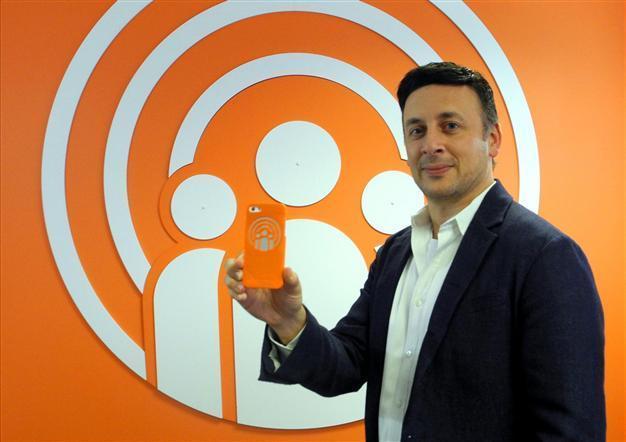New social network aims for real-time connections
WASHINGTON - Agence France-Presse

Michael Chasen, founder and chief executive of Social Radar, poses in his offce in Washington, DC, on January 24, 2014. AFP Photo
Walk into a room of people, and your smartphone can tell if you have a connection to any of them, if it can find the right data.
A social networking app called SocialRadar released Thursday analyzes smartphone users' social networks including Facebook and Twitter, and correlates that with location data, to let people know in real time about their connections to those around them.
While some apps already use geolocation data, SocialRadar aggregates information from major social networks and matches that with a smartphone's location for "real-time intelligence." This means you can see in real time the people around you with whom you share a connection across several services.
"There are over a billion people with smartphones, and more than two billion social media profiles in the cloud, but no intersection of that information," says SocialRadar founder and chief executive Michael Chasen.
Chasen, 41, who founded the education software tool Blackboard in 1997 and sold it in 2011 for $1.7 billion, says SocialRadar can be useful for business networking as well as for socializing.
"I can walk into a restaurant and find three people I'm connected to," Chasen told AFP in an interview in SocialRadar's office in downtown Washington.
"All this is in the cloud if you can connect this information." Chasen said he believes SocialRadar may be used for dating, "but I think it will be used for business too. It is the ultimate networking tool." SocialRadar aggregates and merges data from top social networks including Facebook, LinkedIn, Twitter, Instagram, Foursquare and Google+ with live location information from smartphones.
This enables users to find colleagues, friends, and friends of friends if they are connected on one of the networks.
For technical and privacy reasons, SocialRadar provides this information only where users already have a connection, such as on Facebook or another network, or if they use SocialRadar. But Chasen said that still represents a lot of connections.
"What I want to know is who is near me and how I am connected," he said.
The app can create alerts or search within a specific radius -- from a few hundred meters (yards) to several kilometers (miles) -- for people with connections.
SocialRadar has been released in North America for the iOS platform for iPhones, and a version is in the works for Android and for Google Glass -- which would enable users to get information delivered for easy viewing.
Chasen said he is acutely aware of privacy concerns, especially about location information, and that SocialRadar allows its users to determine if they want to be visible or not to their social networking friends and connections.
"One of our top priorities in building this was allowing people to have complete control of their privacy," he said.
The app can be set to allow a user to be public, seen only by friends, to be anonymous or invisible.
But Chasen said that during a beta test of the app using 500 people, the overwhelming majority chose to remain public.
"People don't always want to meet everyone, but they want to know who is there," he said.
International versions of the app are in the works, but Chasen said the app can be used by international travelers -- for example to find someone who speaks their language, or friends who might be in the same location.
The company, which has 20 employees in Washington, has received $12.75 million in venture capital funding in a first round led by New Enterprise Associates, Grotech Ventures and SWaN & Legend Ventures. Among the investors are AOL co-founder Steve Case and sports magnate Ted Leonsis.
Chasen said his work on SocialRadar benefited from his experience at Blackboard, which is used by millions at 30,000 educational institutions.
"I got to spend a lot of time on college campuses and saw a lot of tech trends," he said.
He learned that "students who were sharing their personal information on social networks were also sharing their location information," which opened the door to a service like SocialRadar.
